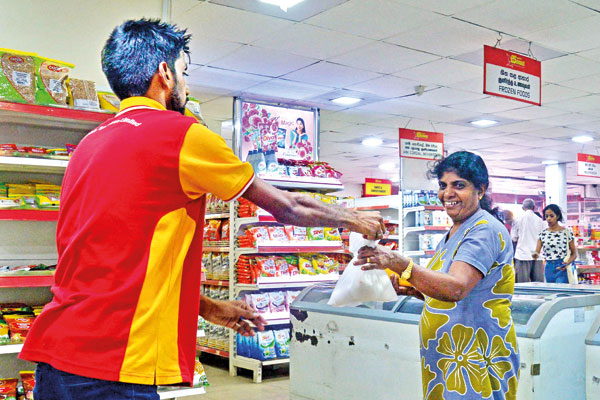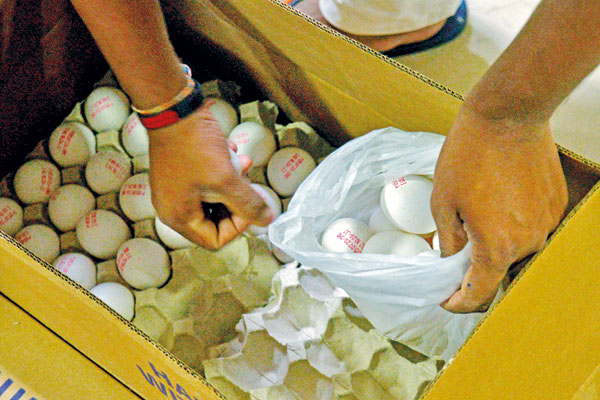News
Safety fears about Indian eggs eased; Sathosa assures more supplies
View(s):By Ryan Casiechetty
Imported eggs would be made available in supermarkets shortly, as eggs made available via Sathosa outlets have turned out to be a fast-moving item, but concerns remain over storage facilities.
Sri Lanka State Trading Corporation Chairman Asiri Walisundara told the Sunday Times that eggs could be stored in a refrigerator for 90 days, or consumed within three days of being removed from the refrigerator climate.

Happy consumers: The lesser priced, imported eggs sold out fast. Pix by Eshan Fernando
Eggs are being distributed to the Sathosa supermarkets to be sold at Rs 35 an egg, while being sold to supermarkets with special packaging, resulting in a hike in the egg price at those shops to around Rs 40 and Rs 45, he said.
The Government has allowed the import of one million eggs a day from India, according to Mr Walisundara.
He said people had nothing to fear about health safety as the egg consignments are heavily tested under five different scans and sample testing methods.
The testing is done around four days prior to releasing the eggs in to the local market. Initially, the distribution of eggs was restricted to only bakeries and hotels. Later, distribution was limited to the Western Province, and now more districts in other provinces are set to receive these eggs.
After the release of the eggs via Sathosa outlets, the stocks were quickly sold out, with some being sold out in less than an hour.
Sathosa’s Biyagama outlet store manager said there was high demand. “Around 3,600 eggs were available for sale on Thursday, and all of them were sold out in no time,” he said.
Although they haven’t set any specific limit to the purchasing quantities, the stores do not allow customers to purchase a large number of eggs, and they ensure all customers have the ability to purchase.
Lanka Sathosa Chairman Pasanda Yapa Abeywardena told the media that there was an abnormally high demand for eggs during the first few days of releasing them to the market, and currently they were taking steps to increase supply.
He confirmed that they have adequate stocks. He added that if the demand was continually rising, they might have to set up a limit on purchases per customer. 
Local poultry farmers are against imports from India.
Ajith Gunasekara, president of the All Ceylon Poultry Traders Association, told the Sunday Times: “We strongly disagree with this decision taken by the Government to import eggs from India as this further discourages local poultry farmers.”
He charged that since the economic crisis, the Government had not been encouraging local poultry farmers.
“During recent years, local farmers had to pay a tax of Rs 6 per egg, and by this the farmers got further discouraged. Around August last year, some farmers sold their egg-laying chickens for poultry meat. They are no longer available for production. Now, the local industry is developing and will be able to supply eggs island-wide by December,” he said.
On the health risks of imported eggs, he claimed these eggs were imported from areas highly infected with bird diseases.
The association is looking forward to meeting with Government officials to raise concerns about local poultry farmers.
Sri Lanka produces around 3,000 million eggs per year, however, this has been cut to 2,000 million eggs per year. Eggs are considered the most economical protein-rich diet.
Consumers at Sathosa outlets told the media that they are pleased to buy eggs at a low price considering the earlier prices of above Rs 60. Also they hope that this price remains the same.
On Tuesday, an order that had fixed the maximum retail price for eggs in April was revoked by a gazette issued by Consumer Affairs Authority Chairman Shantha Niriella.
In April, the CAA mandated that a white egg should be sold at Rs 44 and a brown egg at Rs 46. The maximum retail price for a kilogram of white eggs was set at Rs 880, and brown eggs at Rs 920. However, the price control mechanism could not be implemented efficiently since there was a shortage of eggs in the market and merchants continued to sell eggs at higher prices at their discretion.
The best way to say that you found the home of your dreams is by finding it on Hitad.lk. We have listings for apartments for sale or rent in Sri Lanka, no matter what locale you're looking for! Whether you live in Colombo, Galle, Kandy, Matara, Jaffna and more - we've got them all!


